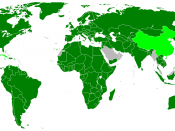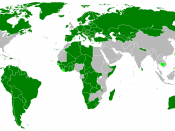Where reservations to human rights treaties are concerned, two conflicting views exist. One view is that, as consent remains the governing principle of the reservation regime, the discretionary power to determine the permissibility and validity of reservations should be left to the individual states who are party to the treaty. On the other hand, it is argued that because of the special features of human rights treaties, a different kind of regime should apply to these treaties, with the supervisory organs of these treaties being competent to decide on the permissibility of reservations, and to decide on the effect of inadmissible reservations. These opposing views are based on the wider controversy between supporters of the interests of the international community, and those of state sovereignty. A key issue to this discussion is whether human rights treaties are sufficiently different from other treaties so as to require distinct rules for determining the admissibility of reservations.
In its controversial General Comment 24/52 of 2 November 1994, the UN Human Rights Committee (HRC) responded to the concerns that the large number of reservations to the International Covenant on Civil and Political Rights 1996 (ICCPR) might undermine its effectiveness. The application of the VCLT in relation to other human rights treaties was also discussed. The Committee emphasised the special nature of human rights treaties and stated that the provisions of the VCLT laying down the circumstance in which reservation would be allowed were "inappropriate to address the problems of reservations to human rights treaties". It was felt that reservations are incompatible with human rights treaties because of the nature of such treaties
In relation to the ICCPR, the Committee stated that states could not make reservations in relation to provisions of the ICCPR which reflected customary international law, and in relation to its other...


